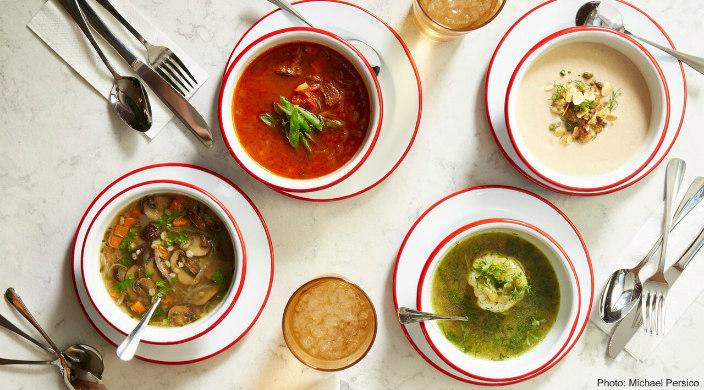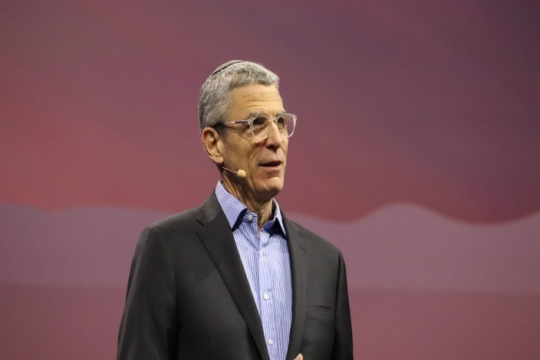
Steve Cook has impressive Reform Jewish connections. His mother’s uncle was Rabbi Nelson Glueck, former president of the Reform seminary, Hebrew Union College-Jewish Institute of Religion; his father, Julian Cook, and uncle, Jonathan Brown, are retired rabbis; and his brother, Alan, and sister-in-law, Jody, are rabbis serving Sinai Temple in Champaign, IL.
Steve chose a different career path, partnering with Chef Michael Solomonov to create a series of successful Jewish-influenced restaurants, including Zahav, Federal Donuts, Federal Donuts, Dizengoff, Abe Fisher, Rooster Soup Co., and Goldie. Cook and Solomonov have co-authored two books: the 2016 James Beard award-winning cookbook, Zahav: A World of Israel Cooking and their just released “wacky” take on the art of donut making, Federal Donuts.
ReformJudaism.org: You’ve said that you and Michael Solomonov, had “the same culinary vocabulary growing up.” What did that mean for you?
One of my enduring Jewish food memories is my mother’s brisket on Friday nights. I would take a chunk off the top of her homemade challah, apply some yellow mustard, and soak it in the juices of the brisket. My father makes homemade gefilte fish every Pesach, which is a real treat. He also took us out to this little Israeli restaurant for hummus. He’s loved Israeli food since the days he studied in Israel as part of his rabbinic training.
More than anything else, it was the food that bound me to Judaism.
You graduated from the Wharton School of the University of Pennsylvania and had been a successful Wall Street investment banker for six years before deciding to enroll in the French Culinary Institute. What prompted that career change?
I was always daydreaming about food, and whenever I had any time on my hands, I brainstormed about cooking. I think the turning point came while vacationing at a friend’s cottage in Spain, where I found great pleasure in cooking simple meals on a portable camping stove.
I opened Marigold Kitchen in 2004, and worked myself into the ground, which I really didn’t mind. But I had met my future wife, Shira, and our schedules kept us from being together. That’s what catalyzed my decision to give up the cook’s lifestyle and hire Michael Solomonov to take over the kitchen.
How did you and Michael come up with the idea of opening an Israeli restaurant?
The idea was Mike’s, and we talked about it for a long time. We traveled to Israel before opening Zahav and brought along our staff so they could see how things are done differently there.
How is dining out different in Israel?
When you sit down in a restaurant, Jewish or Arab, your table is immediately filled with little salads, hummus, pita, and a carafe of lemonade. Here, you sit down and are presented with a menu. There, they generously put out food, and think about the transaction later.
It goes back to Abraham in the Bible. He opened all sides of his tent when he spotted three strangers coming near. To be truly hospitable to somebody, you have no expectation that they’re going to do something for you in return.
In the restaurant business, of course, that kind of true selflessness goes away.
That’s not the case with Rooster Soup Co., your restaurant that donates all profits to provide meals to Philadelphia’s most vulnerable citizens. How did you get involved in this charitable endeavor?
Several years ago, a friend asked me to attend a meeting of Broad Street Hospitality. I was so moved by the respectful service given the seated guests by the servers – no different than paying patrons receive at fine restaurants – that I joined the advisory council. Last year Broad Street served more than 76,000 meals in this dignified manner with no expectation of repayment from the recipients.
You’ve said that the cookbook you coauthored with Michael, Zahav: A World of Israeli Cooking, has a story to tell. What’s that story?
It’s the extraordinary story of how a country of less than 70 years and populated by Jews from so many widespread diaspora communities shaped a national identity through food.
How has Israeli dining here changed since you opened Zahav in Philadelphia in 2008?
Israeli food no longer has that exotic, ethnic tag. We are starting to see influences of Israeli cuisine everywhere. There’s a hunger out there for the next new thing, and I think Israeli food is part of that trend.
How has dining changed in Israel over the same period?
Israeli chefs are coming back from abroad and, instead of opening Japanese, Italian or French restaurants, are putting their own spin on Israeli cuisine. That helps drive food tourism in Israel. One of the most exciting things about dining in Israel is discovering how Israeli cuisine has evolved. And I’m rarely disappointed.
Steve Cook and Michael Solomonov will be a featured speakers at the Union for Reform Judaism's 2017 Biennial in Boston, December 6-10, 2017.
Photo: Michael Persico
Related Posts

As Numerous as the Stars of Heaven

Chicago in the Jewish Limelight
